INTELBRIEF
January 22, 2018
IntelBrief: The U.S. and Turkey Showdown in Northern Syria

- On January 19, Turkey reportedly began shelling Syrian Kurdish positions in Afrin, located in the north of Syria.
- The U.S. announcement of a ‘Border Security Force’ in Syria, made up of some Kurdish fighters, has thrown the already unstable region into greater turmoil.
- It is impossible to overstate how strenuously Turkey objects to any semi-permanent armed Kurdish force on its southern border with Syria.
- Turkey, Russia, and Iran have the greatest influence in Syria and are united in a desire to block U.S. interests in the country.
Turkey began conducting artillery strikes on the border town of Afrin on January 19, a move that Turkish Defense Minister Nurettin Canikli said was the ‘de facto start’ of an invasion. A great deal depends on the cooperation of Russia, which has troops in parts of Afrin and whose fighter planes patrol that area in support of the Assad regime. There were unconfirmed reports that Turkey and Russia had worked out an agreement, clearing the way for greater Turkish military operations, though these reports have been denied by Russian officials. Turkey has reputedly warned of attacking Kurdish rebel fighters that have gathered in Afrin. The Syrian Kurdish People's Protection Units (YPG) reported over 70 shells launched against their positions by late day, January 19. Turkey considers the YPG to be another wing of the Kurdistan Workers' Party (PKK), the terrorist group considered by Ankara as its greatest domestic threat.
The apparent attack has been long in coming, with U.S. direct military support for the Syrian Democratic Forces (SDF), which has a significant Kurdish element, a source of continual and growing pressure between Washington and Ankara. The U.S. has tried to walk a very fine line in Syria, depending heavily on the Kurdish rebels in the fight against the so-called Islamic State, while not rupturing the already strained relations between Turkey and the U.S. As the battlefield shrinks in Syria, the line has become near impossible to maintain, and the U.S. will likely have to either dramatically scale back its support of the Kurdish rebels—which would be seen as yet another U.S. betrayal of the few groups that have consistently supported and helped the U.S. in Syria and Iraq—or risk indirect and even direct conflict with Turkey, a fellow NATO member.
The latest spike in tensions came about with an announcement by the U.S. of a 30,000-fighter ‘Border Security Force.’ Half of the force would be made up of existing Kurdish and Arab SDF members, and the rest would be new recruits. Ankara’s reaction was as swift as it was predictable: Turkish President Erdogan vowed to ‘suffocate’ the border force before it could take shape. Erdogan directly accused the U.S. of ‘creating a terror army on our border.’ The initial statement about the border force was that it was intended to keep the Islamic State from regrouping while keeping foreign fighters from traveling freely. As Turkey’s reaction grew more vocal and aggressive, the U.S. stated that the rollout of the announcement had been handled poorly and that in no way was it creating a ‘border force’—even though that was the term it had used to announce its plans.
There was also opposition within Syria to the idea of the U.S. setting up a semi-permanent armed rebel force inside the country. Russia also expressed opposition. Turkey, Russia, and Iran have the greatest influence in Syria, though the three countries are not operating in lockstep; the one source of unity among them is blocking U.S. interests in Syria, and they have the ability to do so. The U.S.-Turkish relationship has been deteriorating, especially since the July 2016 failed coup. Ankara accused the U.S. of supporting the coup. As Turkey engages in violent action against those the U.S. has spent several years supporting as partners in the fight against the Islamic State, it is likely relations between Washington and Ankara will continue to worsen.
For tailored research and analysis, please contact: info@thesoufancenter.org
[video width="960" height="540" mp4="https://thesoufancenter.org/wp-content/uploads/2018/01/Final-Edit-1-114.mp4" poster="https://thesoufancenter.org/wp-content/uploads/2018/01/Screen-Shot-2018-01-22-at-02.57.45.png"][/video]